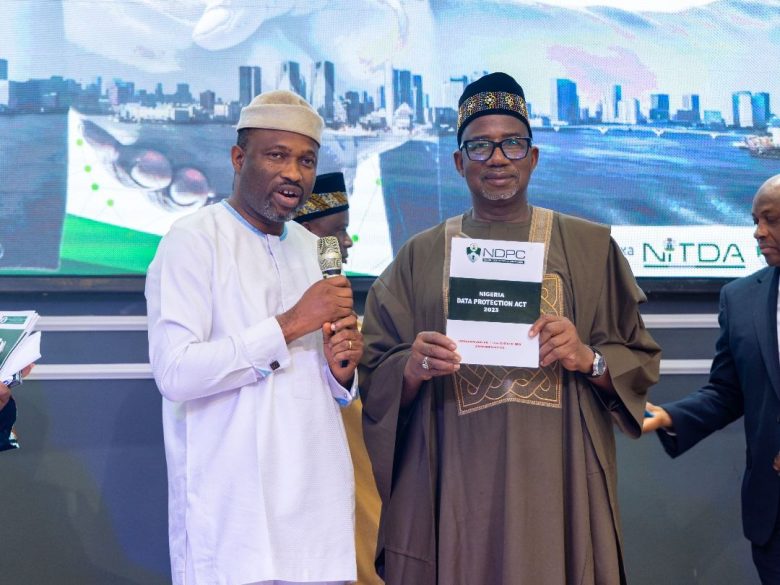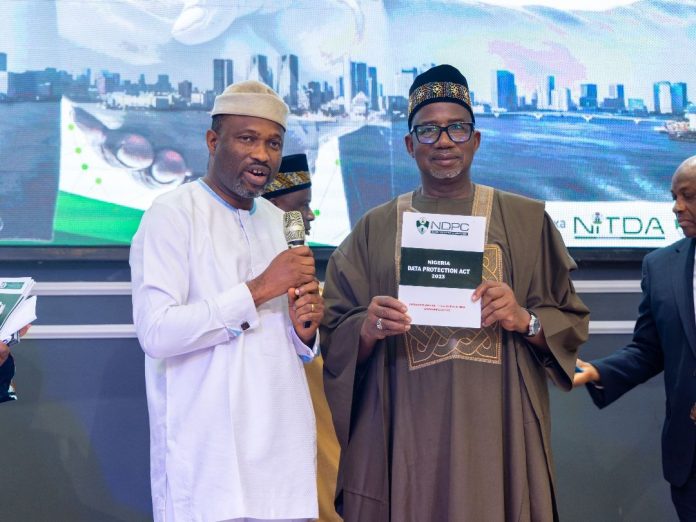The Nigeria Data Protection Commission (NDPC) has signed a landmark Memorandum of Understanding (MOU) on Data Governance with the Bauchi State Government, solidifying a partnership aimed at enhancing data protection and compliance with the Nigeria Data Protection Act (NDP Act), 2023.
The signing ceremony took place during the launch of the State’s Cybernation and Digital Literacy Skills programme. At the event, the Executive Governor of Bauchi State, His Excellency Senator Bala Abdulkadir Mohammed, emphasised the importance of data protection in building a trustworthy and sustainable digital economy. In his words, “Ministries, Departments and Agencies of government in the state must align their data processing activities with the Nigeria Data Protection Act, 2023. I have approved the establishment of a Data Protection Service Unit for the State.”
Governor Mohammed also commended the visionary leadership of Dr. Vincent Olatunji in steering the data protection ecosystem in Nigeria, underscoring a strategic move to safeguard citizens’ digital rights and build trust in the state’s growing digital economy.
In line with the MOU, the collaboration is designed to promote compliance with the NDP Act through several key initiatives, including:
• Developing and implementing state-wide data protection policies.
• Building capacity for public institutions and civil servants.
• Launching awareness campaigns for citizens and businesses.
• Establishing data compliance frameworks across Ministries, Departments, and Agencies (MDAs).
• Upholding data subject rights.

In his address during the ceremony, the National Commissioner/CEO of the NDPC, Dr Vincent Olatunji, who was represented by the Head of Legal, Enforcement, and Regulations of the Commission, Babatunde Bamigboye, Esq., commended the State Government for the historic initiative on data privacy and protection.
He recalled the historic step taken by His Excellency, President Bola Ahmed Tinubu, GCFR, in signing the Nigeria Data Protection Bill into law in 2023. He highlighted the subsequent release of the NDP-Act General and Implementation Directive, 2025, by the NDPC to provide guidance for the implementation of the NDP Act.
This step consolidated Nigeria’s efforts in protecting the fundamental rights and freedoms of Nigerians in the Fourth Industrial Revolution (4IR). He pledged the support of the NDPC by mainstreaming data protection principles into the laudable initiatives of the Bauchi State Government aimed at building a trustworthy digital economy.
Dr Olatunji pointed out that unlike previous industrial revolutions where African nations were relegated to being suppliers of raw materials and consumers of finished goods, the 4IR empowers every village to become a potential hub of production. To achieve this, all levels of government must work together to guarantee the 5Vs of data: Value, Volume, Veracity, Variety, and Velocity.
With a population of about 230 million people and over 250 ethnic groups, Nigeria has what it takes to start, but warned that the real challenge lies in sustainability. He explained that data protection is the key to this sustainability, as it builds the trust thempowers the data processing value chain, secures investor confidence, and facilitates cross-border data flows for mutual economic development.
Dr. Olatunji also detailed the risks citizens face without proper data protection, including identity theft, loss of assets, and exclusion from essential social and economic services. He noted that over 130 countries worldwide are addressing these risks by enacting robust data protection laws, and establishing independent Data Protection Authorities (DPAs), in order to ensure the adequacy of data protection as a precondition for cross-border data transfers.
He emphasised that the Federal Government cannot accomplish this alone, and that collaboration with sub-national governments is not just beneficial, but necessary.
He concluded that Nigeria’s success in this digital future is dependent on the ability of national and sub-national governments to work together to protect the data of every Nigerian citizen, thereby securing and consolidating the nation’s socio-economic.


